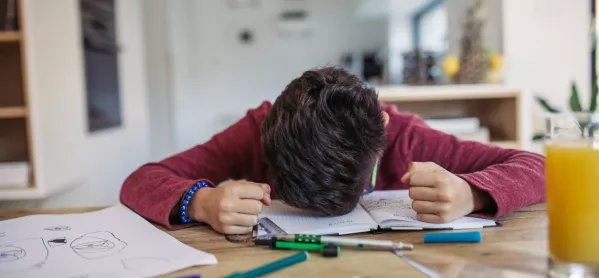- Home
- ‘A third of pupils feel the strain of schoolwork’
‘A third of pupils feel the strain of schoolwork’

Recent figures published by the Scottish government made me want to sling a protective arm around my (usually) happy, carefree primary-aged offspring.
The figures - based on a survey of 22,935 secondary pupils and 20,989 primary pupils - showed that 22 per cent of P5-P7 children were classed as having “lower than average mood”, with 17 per cent of S1-S4 pupils classed as having “very high” emotional problems.
Pupil wellbeing: Homework ‘linked to unhappiness’
Background: Counselling offered to all Scottish secondary students
Investigation: ‘No clear delivery plan’ for school counsellors
Opinion: Why pupils’ and teachers’ mental health are inextricably linked
Advice: Four ways to support student mental health struggles
The surveys, which were different for primary and secondary pupils, but touched on similar themes, covered things like how happy they were with their lives; the extent to which they felt good about themselves; and if they wished they had a different kind of life.
The thought of a sizeable proportion of children and young people rating themselves poorly in relation to these questions is bleak, especially as we think of the school years as a precious and relatively carefree time before big responsibilities like holding down a job, raising children and paying a mortgage start to kick in.
Fears about pupil wellbeing
But then I cast my mind back (reluctantly) to my own teenage years (cringe). I have plenty of happy memories from that time but would I choose to revisit it? Not a chance.
My overriding impression is that it was an era of unpredictability and uncertainty, where fallouts with friends or inadvertently popping up on the radar of a school bully could transform your life for the worse for weeks, if not months.
Happiness at this age is, therefore, inconstant and erratic as you learn what qualities to look for in a friend, who you should trust and who you should keep at arm’s length. Having said all that, we should, of course, be concerned that such a high proportion of primary and secondary pupils are essentially unhappy. Even more concerning is that girls are suffering more than boys - and we don’t really know why.
The researchers found that by S4, one in three girls had very high emotional problems compared with one in 10 boys - at primary there was just a small difference between the genders.
This higher rate of emotional problems among girls was not explained by the risk factors that the researchers looked at, such as having no family member to speak to or few friends.
The research says: “Although girls are more likely to feel strained at school or excluded from their peers, these factors cannot account for higher rates of emotional problems in girls.”
Therefore, the researchers say more work needs to be done in order to explain this gap in good mental health. They suggest one culprit could be social media, which has rapidly increased in popularity and which girls engage with differently. The researchers say that girls tend to prefer photo-based platforms and compare themselves more to others they see on social media.
Schools might wonder how effectively they can act on this information and make a difference but the research includes plenty of other nuggets schools will find easier to engage with.
The pressure of workload
Interestingly, the school risk factor most likely to predict whether a child had emotional problems was feeling “strained by school work” - children who identified this as an issue were three times more likely to have emotional problems. Also significant but less impactful were “pupils do not respect each other”, “child does not like school” and “child feels that teachers do not care about them”.
Overall, 33 per cent of secondary pupils said they felt under pressure and 36 per cent of primary pupils said they worried about schoolwork.
Are primary schools aware that over a third of their pupils feel this way? Do they know who these pupils are?
Also, how common is it for secondary teachers to be aware of the homework their colleagues are setting or if their plans for a test clash with an assessment being set in another department?
Workload is a key issue for teachers - but this survey shows it’s also something schools need to be aware of when it comes to their pupils.
Keep reading for just £1 per month
You've reached your limit of free articles this month. Subscribe for £1 per month for three months and get:
- Unlimited access to all Tes magazine content
- Exclusive subscriber-only stories
- Award-winning email newsletters



